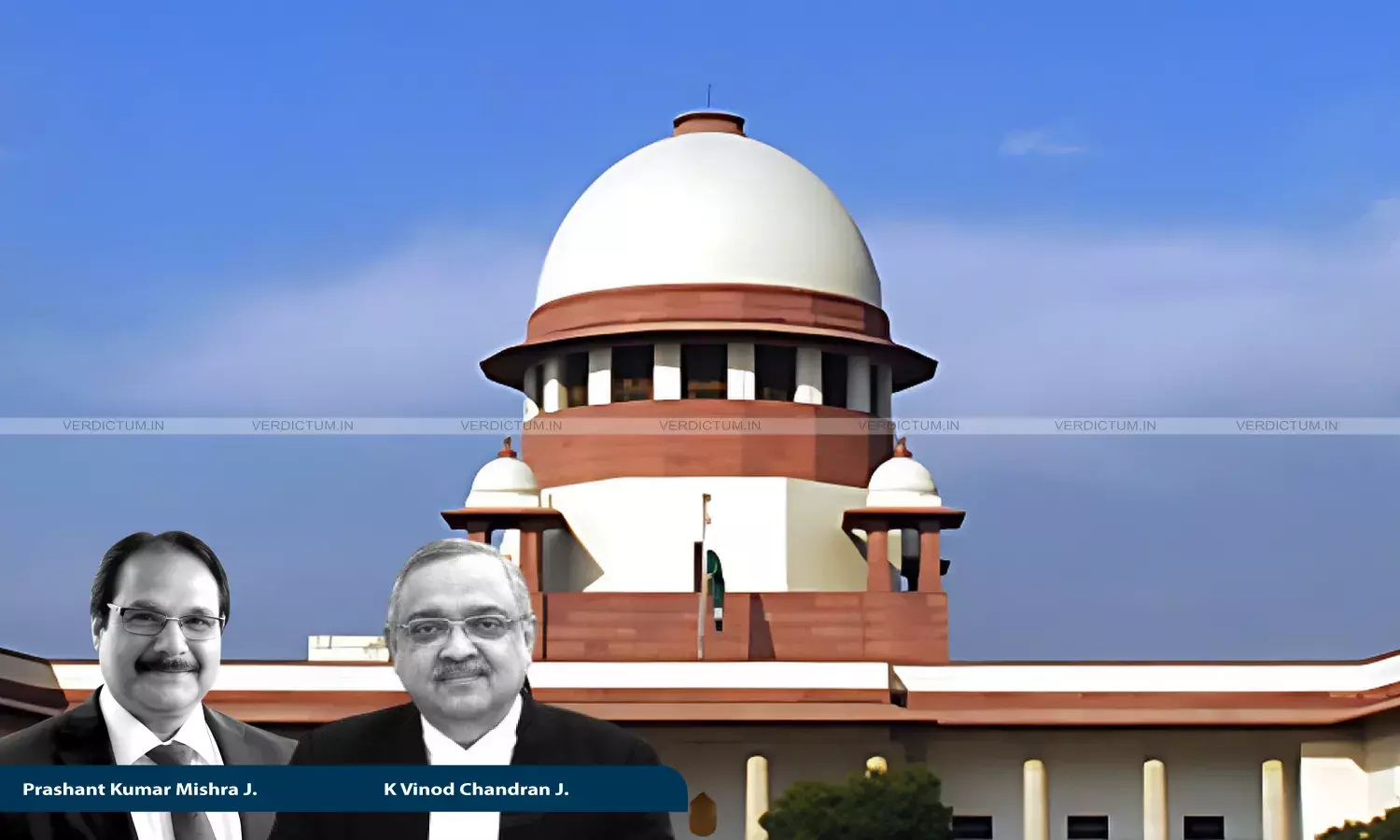Manure Kept & Waste Dumped In Property Not Valid Ground To Find Possession: Supreme Court
The Supreme Court was considering a matter where the concurrent findings on facts as entered into by the trial court and the first appellate court, to reject the suit filed, were overturned by the High Court.

Justice Prashant Kumar Mishra, Justice K. Vinod Chandran, Supreme Court
While dismissing an appeal in a suit for possession, the Supreme Court has held that the manure kept and waste dumped in the property cannot be a valid ground to find possession, especially when the plaintiff claimed that waste was being thrown in the property without permission and despite specific objections raised against such acts.
The Apex Court was considering a matter where the concurrent findings on facts as entered into by the trial court and the first appellate court, to reject the suit filed, were overturned by the High Court in the Second Appeal.
The Division Bench of Justice Prashant Kumar Mishra and Justice K. Vinod Chandran stated, “Insofar as the land indicated as ‘PCDF’, the trial court entered a finding based on the Commissioner’s report. The Commissioner’s report only spoke of the manure kept and waste dumped in the property, which according to us cannot be a valid ground to find possession, especially when the case of the plaintiff was that waste is being thrown in the property and manure kept by the 9th defendant, without permission and despite specific objection raised against such acts.”
Advocate Satyajit A. Desai represented the Appellant, while Advocate Gagan Sanghi represented the Respondent.
Arguments
It was the case of the appellants that though the sale deed showed the extent of 150 square metres, actually, as per the revenue records produced by the defendants, the vendor of the plaintiff had possession only of 109.70 square metres. The balance portion was an open space which was in the possession of the deceased appellant, the eighth defendant in the suit. The revenue records were corrected after the written statement was filed by the defendants. Considering that the plaintiff did not seek recovery of possession, it was argued that there was no question of law arising in the Second Appeal, and the High Court erred in reversing the concurrent finding on facts of the trial court and the first appellate court.
The respondent plaintiff had sought a declaration of ownership and possession with consequential injunction. The plaintiff had the entire property, wherein admittedly there was a building. The disputed land was lying contiguous to the plot in which the building was constructed. The defendants were dumping waste in the property and keeping manure thereon, which was objected to. On objections raised, there was a threat levelled, and hence the suit was filed. It was submitted that the mere finding of manure and waste on the property could not lead to a finding of possession.
Reasoning
On a perusal of the plaint, the Bench noted that the averments indicated that the suit was necessitated since the defendants failed to give heed to the objections raised by the plaintiff against the defendants using the property to keep manure and dump waste.
Referring to the judgment of the Trial Court, the Bench noticed that the eighth defendant failed to file a written statement, and the ninth defendant alone contested the matter and adopted the objection filed to the injunction application, as the ninth defendant’s written statement. The Trial Court found that the plaintiff could not establish his title either over ‘ABCD’, marked in the map wherein the building existed and also ‘PCDF’, the adjacent open plot, which was the bone of contention between the plaintiff and the ninth defendant. The Bench was of the view that there was no cause for the trial court to find the title of the entire ‘ABCD’ to be not established, especially when there was a title deed.
On the issue relating to correction in revenue records, the Bench asserted, “The revenue records produced by the plaintiff showed the corrected area as per the sale deed. Merely because the correction was done in the course of the suit is no reason to disbelieve the public record maintained.” It also held that the trial court ought not to have suspected the sanctity of the correction, unless it was disproved.
The Bench further stated, “But for the bland assertions of partition and common use, nothing is produced to establish the same nor is anybody examined to substantiate the contentions. Without any evidence regarding the oral partition and without establishing the connection with such partition or relationship with the vendor or his father, who was the original owner, the 9th defendant could not have raised a valid claim of possession-in-common, of the property.” As per the Bench, the first appellate court’s finding on Section 34 of the Specific Relief Act could not be sustained since the ninth defendant did not establish possession.
The Bench also held that the plaintiff’s vendor’s possession was established, and the plea of common use set up by the ninth defendant was demolished. “We cannot but reiterate that the deceased 1st appellant, now represented by the 2nd appellant and the appellants 3 to 5 never contested the suit and they cannot file an appeal and prosecute it based on the contentions of the 9th defendant though an identity of interest is claimed by the 9th defendant”, the Bench asserted while dismissing the appeal.
Cause Title: Kisan Vithoba Aakhade v. Suresh Tukaram Nerkar (Neutral Citation: 2025 INSC 1092)
Appearance
Appellant: Advocates Satyajit A. Desai,Sachin Patil, Pratik Kumar Singh, Abhinav K Mutyalwar, Sachin Singh, Puneet Sharma, Sanchit Agrahari, AOR Anagha S. Desai
Respondent: Advocates Gagan Sanghi, Farah Hashmi, AOR Rameshwar Prasad Goyal

